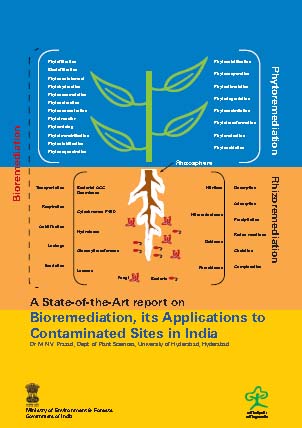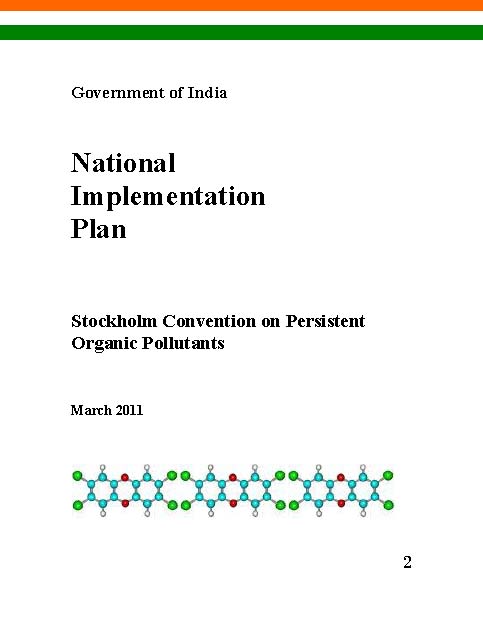Ministry of Environment & Forests (MoEF)
Reports of environmental clearance being given to Vedanta at Niyamagiri incorrect - A press note by MoEF
Posted on 05 Jul, 2011 12:21 PMThe Environmental Clearance in that area which was considered in the Ministry of Environment and Forests in fact pertains to the Lanjigarh Bauxite Mining Project, located inter alia in Niyamgiri Reserve Forest covering two districts Raigarha and Kalahandi of Odisha, belonging to M/s Orissa Mining Corporation Ltd.
Environmental impact assessment - Notification and amendment (2006) - Ministry of Environment and Forests
Posted on 18 Jun, 2011 10:01 PMThe document emphasises the need for taking prior environmental clearance in case of new projects or activities or expansion of already existing activities in accordance with the objectives of National Environment Policy that has approved by the Union Cabinet on 18th May, 2006 and the procedure specified in the notification, by the Central Government or the State or Union territory Level.
Bioremediation, its applications to contaminated sites in India - A state of the art report by Ministry of Environment and Forests
Posted on 17 May, 2011 12:42 PM Bioremediation is emerging as an effective innovative technology for treatment of a wide variety of contaminants and is an invaluable tool box for wider application in the realm of environmental protection.
Bioremediation is emerging as an effective innovative technology for treatment of a wide variety of contaminants and is an invaluable tool box for wider application in the realm of environmental protection.
Bioremediation approach is currently applied to contain contaminants in soil, groundwater, surface water, and sediments including air. These technologies have become attractive alternatives to conventional clean-up technologies due to relatively low capital costs and their inherently aesthetic nature.
It includes phytoremediation (plants) and rhizoremediation (plant and microbe interaction). Rhizoremediation, which is the most evolved process of bioremediation, involves the removal of specific contaminants from contaminated sites by mutual interaction of plant roots and suitable microbial flora.
The report documents the existing knowledge for the benefit of regulators, who evaluate the quality of environment and for practitioners, who have to implement and evaluate remediation alternatives at a given contaminated site. It is expected to provide basic understanding of the bioremediation mechanisms to the reader. The technical descriptions provided in this document concentrate on the functioning mechanisms: phytosequestration, rhizodegradation, phytohydraulics, phytoextraction, phytodegradation, and phytovolatilization.
India's forests and REDD+ - A factsheet prepared by Ministry of Environment and Forests
Posted on 28 Apr, 2011 04:29 PMThe benefits of working with REDD and the need and benefits of getting more ambitious by accepting REDD+, which is about finding financial value for carbon stored in standing forests which therefore incentivises the positive elements of conservation is also elaborated here.
National Green Tribunal (NGT) – Relevant notifications from the Ministry of Environment and Forests
Posted on 22 Apr, 2011 05:16 PMForest and environment clearance given to 7 new projects in Uttarakhand - Press release by MoEF
Posted on 15 Apr, 2011 05:01 PMMembers of Parliament from Uttarakhand had a meeting with the Hon’ble Minister for Environment and Forests to discuss the matter. The projects have been appraised and approved by the Ministry’s Environmental Appraisal Committees and the Forest Appraisal Committee, after which the decision has been taken.
The projects that have been cleared include:
- Collection of stone, boulders and other minor minerals from 1497 ha area in river bed of Gola river till the end of next working season i.e. till 31.5.2012
Stockholm Convention on Persistent Organic Pollutants – Draft National Implementation Plan by the Ministry of Environment and Forests (2011)
Posted on 14 Apr, 2011 07:35 AM As per Article 7 of the Stockholm Convention, countries are required to develop the National Implementation Plan (NIP) of the Stockholm Convention on Persistent Organic Pollutants (POPs) to demonstrate how the obligations under the Convention would be implemented. The Convention was adopted with the objective of protecting human health and the environment from POPs and came into force from April 2006 in India.
As per Article 7 of the Stockholm Convention, countries are required to develop the National Implementation Plan (NIP) of the Stockholm Convention on Persistent Organic Pollutants (POPs) to demonstrate how the obligations under the Convention would be implemented. The Convention was adopted with the objective of protecting human health and the environment from POPs and came into force from April 2006 in India.
The Ministry of Environment and Forests, which is the nodal ministry for the Global Environmental Facility (GEF) and Stockholm Convention in India has prepared a NIP and has committed itself to its implementation subject to adequate assistance. It has had to harmonize the interests and stand points of different sectors involved and thereafter determine the position of the Indian government.
India understands that compliance with the obligations on Parties set out in the Convention will have a significant and positive influence not only on India‘s own chemicals management regime but also on the ultimate global success of the Convention. Since among the POPs only Dichloro Diphenyl Trichloroethane (DDT) and Polychlorinated Biphenyls (PCBs) are used in the country the inventory concentrated on DDT storages and facilities where PCB-containing electrical equipment was found.
Bio-remediation project announced for Buddha Nala, Ludhiana - MoEF Press release
Posted on 13 Apr, 2011 11:14 AMFollowing the invitation of Member of Parliament (Ludhiana) Mr. Manish Tewari, the Hon’ble Minister for Environment and Forests Mr. Jairam Ramesh along with officials of the Ministry of Environment and Forests including the Chairman of the Central Pollution Control Board, visited the site of the Buddha Nala in Ludhiana, Punjab in September of 2010.
MoEF reconsitutes the National Coastal Zone Management Authority
Posted on 24 Mar, 2011 01:32 PMthe Central Government constituted the National Costal Zone Management Authority for a period upto the 31st December, 2010.
And whereas, the Central Government is of the view that such an authority must be reconstituted.
National mission for a green India - Presentation to the PM's council on climate change - Latest update from the MoEF
Posted on 22 Mar, 2011 04:15 PMThe draft was made available in 11 languages.
There were 7 regional consultations held at Guwahati, Dehradun, Pune, Bhopal, Jaipur, Vizag and Mysore over a month and a half starting from 10th June to 15th July and attended by the Minister and the team.